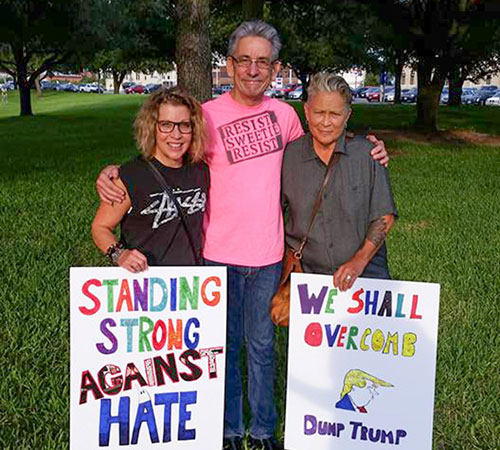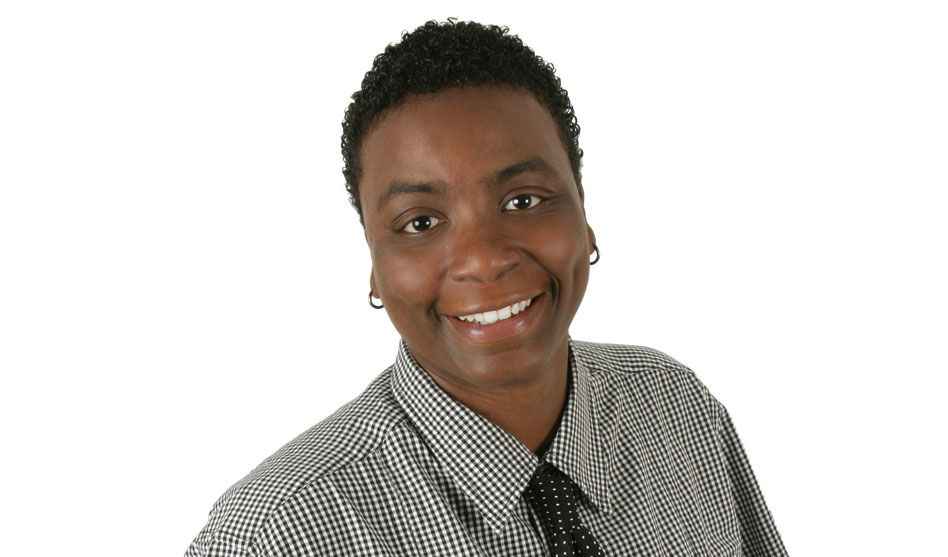C. d. Kirven
Activists call for white LGBTQ people to join the fight for black equality
Tammye Nash | Managing Editor
nash@dallasvoice.com
“We understand what it means to rise up and push back against a culture that tells us we are less than, that our lives don’t matter. Today, we join together again to say #BlackLivesMatter and commit ourselves to the action those words require.”
So begins “An Open Letter from LGBTQ Organizations Condemning Racist Violence.” It has been co-signed, so far, by about 600 LGBTQ and allied organizations across the U.S., including Resource Center, Cathedral of Hope, Equality Texas, Texas Pride Impact Fund and Transgender Education Network of Texas.
This statement is a promise that these organizations and the LGBTQ rights movement they represent does — and will continue to — stand in solidarity with black Americans as they fight not just to gain equal rights and fair treatment in law in this country, but to gain equal rights and fair treatment in reality.

Gary Bellomy, center
This letter was part of the tidal wave of reaction after video went viral of now-former Minneapolis police officer Derek Chauvin kneeling with all his weight on the neck of George Floyd, killing him, on May 25. Chauvin, along with three other officers involved, were fired within 24 hours of Floyd’s death. But it took several days for Chauvin to be arrested and charged only with 3rd degree murder and 2nd degree manslaughter. And it wasn’t until June 3 that those charges were upgraded to 2nd degree murder and the other three officers were charged with criminal offenses.
Floyd is not the first unarmed black man killed by police. But his murder was videoed — Chauvin kneeling with all his weight on Floyd’s neck for eight minutes and 46 seconds, as Floyd cried out in pain, saying over and over that he couldn’t breathe, pleading with officers for his life, calling for his late mother. The world could watch as his cries grew weaker, as his struggling stilled while bystanders screamed out for the officers to get off him and render aid, and the officers ignored all their pleas.
The world has reacted in horror and outrage. Protests — some that have turned into violent rioting and have been followed by looting and destruction — have happened daily in the two weeks since George Floyd was killed. Statements, like the letter from the LGBTQ and allied organizations, have piled up and, here in North Texas and around the country, LGBTQ people of all races have joined the protests.
But the letter is just words on paper, words on a screen, unless it is backed up by action. And the protests will be just flashpoints of anger if we do not continue to fight for black Americans, especially those in our own LGBTQ community.
“I hate to say it like this, but injustice anywhere is injustice everywhere,” longtime activist C.d. Kirven said this week. “It is hurtful to me to see comments from gay people [criticizing the protests by] saying, ‘What would Martin Luther King [known as an advocate for peaceful protest] do?” It’s like they are trying to disregard the pain that black people are suffering. They are using Martin Luther King’s memory, his image and his words, as a tool to disregard and ignore the strife that African-Americans are experiencing in this country.”
Kirven, who has spent more than 20 years as an activist for black and LGBTQ rights, said that over the past two weeks of protests, her role has changed somewhat from active participant to more of a monitor.
“My role has flipped somewhat this time,” she said. “Yes, I have marched, and I have spoken. But I have been more of an observer, trying to document what is happening.” And what she has seen has been a large number of young whites — “18-, 19- and 20-year-olds” — who are out in the streets protesting.
“They are saying, ‘I need to be here. We need to help protect the lives of black people, and we do not agree with the brutalizing of any race.’”
But what she is not seeing is many of the older LGBTQ activists, the ones with whom she has stood shoulder-to-shoulder at protests demanding equality for LGBTQ people.
“I feel hurt,” Kirven admitted. “I have never been one to pick and choose which issues I would fight for. LGBTQ rights, women’s rights — I have been there, helping lead the fight. When there is a fight [for equality], I stand up and put my gloves on and fight. Because that’s what freedom fighters do.”
She continued, “I have had so many in the LGBTQ community ask me, when there have been protests, ‘Why isn’t the black community [especially black LGBTQ people] here standing with us? They know what it’s like to be treated this way?’ And I tell them, ‘Because you aren’t there for them. If you won’t stand up for them, there is no reason for them to stand up for you.’”
Gary Bellomy, a white gay man who has spent decades on the front lines in the battle for LGBTQ equality and fair treatment for those with HIV/AIDS, said he has, in the last year, begun to realize how he — and the LGBTQ’s white, mostly gay male leadership has failed people of color — not just the mainstream black community, but especially black LGBTQ people.
For years, Bellomy said, “Gay white men have denied their own sexism and racism. They saw lesbians as over-zealous feminists. And they completely dismissed allegations that they were racists,” he said. “Either they enjoyed sex with black men themselves, or they had friends whose lovers were black. In their own minds, that clearly proved they were free from bias.”
And white gay men completely discounted transgender women, except when using them as “shields,” counter-examples to prove their own masculinity, he continued. When being seen as feminine was a bad thing, Bellomy said, gay men could always prove how butch and manly they were by pointing to trans women as a comparison.
And trans men? “They weren’t even a blip on the gay male radar.”
Gay men are “teachable,” Bellomy said, but it has been a slow process. “Gay men think they have the best intentions for their community, and usually they do. But for too long, those intentions were just about what affected them personally and directly. It took men realizing that the voices of women and minorities enriched the scope of the community. It took them being pushed to begin to realize that valuable lesson.”
Many still have not learned that lesson, he said. Bellomy acknowledged that the high-profile rash of violence against black trans women here in Texas last year gave him the push he needed to continue making the changes he needed to make.
“Last year was a seminal moment in my life as a gay man,” he said. “It was the amazing strides the transgender community made and the aching brutality they experienced that forced me to take a deeper look at what this community could gain and what we could lose” if we don’t all begin to stand up for trans men and women, especially the trans women of color who face the greatest discrimination and the greatest violence.”
For Kirven and other black LGBTQ people, though, it’s not about enriching life; it’s about staying alive.
“We saw that video. We saw that cop kill George Floyd, stepping on him like he was a roach,” Kirven said. “And all I am getting from so many whites is almost a disdain for the plight of black Americans, a disassociation from the fact that we are being killed. Our lives don’t seem to matter — not to the government, and not to the people around us.
“All we are saying is, stop killing us!” she continued. “We are saying our lives do matter. We don’t want to be stepped on and squashed like roaches. And I am begging my own [LGBTQ] community to realize it’s not just about marriage equality; it’s not just about workplace discrimination It’s not all about you! It’s about us.
“And I hope that this community that I love is going to step up and come to the defense of everyone.”














I appreciate your thoughtful article. I’ve been told that there is no racism in Dallas. Maybe I’m “just taking things too personally”. When you know there are people who would hurt you and others who would not intervene…it feels very personal. I see all the mass of bruises my nephew acquired from rubber bullets shot at him during an Austin rally. It further reinforces my search for the activists, neighbors, allies, and others I have stood up for when they needed help ,time, votes, support.etc. Actions speak louder than words.